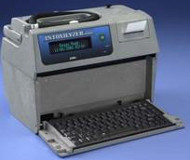10/6/2014
Ohio Supreme Court Questions Breathalyzer AccuracyState must hand over information on Intoxilyzer 8000 machine, Ohio Supreme Court rules.

Breathalyzer machines are frequently the primary evidence in cases involving driving under the influence of alcohol (DUI). The laws are written to make driving with a certain percentage of alcohol in the bloodstream the crime, as opposed to driving recklessly, so that the numeric readout on the machine essentially determines guilt. The Ohio Supreme Court on Wednesday ruled that when blood alcohol content is tested with the Intoxilyzer 8000, the accused are entitled to the full details of how the device produces that readout.
A unanimous high court found that the breath test readings used against Daniel Ilg could not be used in court because the Ohio Department of Health refused to reveal the inner workings of the Intoxilyzer 8000.
Ilg was pulled over on October 22, 2011 after he crashed into a fence and a pole on Beekman Street in Cincinnati. Officer Terry Jacobs arrested him and measured 0.14 on the Intoxilyzer 8000, not quite double the legal 0.08 limit. To defend himself, Ilg filed a discovery request seeking all the information available about the breath testing machine, including maintenance and service records.
The most contentious element of the request was for the COBRA database that the Ohio Department of Health maintains, listing details of every breath test performed throughout the state. The department refused to hand it over, even after a lower court just ordered it to do so. The judge sanctioned the city by suppressing the breath test evidence against Ilg, and Cincinnati appealed.
Cincinnati cited the state law that prohibits DUI defendants from making general attacks on the scientific validity of any breath test approved by the director of the heath department as justification for its refusal to comply. The justices were not impressed by this reasoning.
"The director's approval of the Intoxilyzer 8000 does not preclude an accused from challenging the accuracy, competence, admissibility, relevance, authenticity, or credibility of specific tests results at issue in a pending case," Justice Terrence O'Donnell wrote for the court. "Nothing in either the relevant statutes or our caselaw precludes an accused from attacking the accuracy, competence, admissibility, relevance, authenticity, or credibility of the specific breath-test result rendered by an Intoxilyzer 8000. In this case, the COBRA data that Ilg sought in the subpoena expressly targeted evidence related solely to the Intoxilyzer 8000 that the city used to perform his breath test."
The city offered no evidence that the COBRA database information would not have contained evidence relevant to Ilg's testing, while Ilg had an expert witness who offered evidence that the information was relevant.
"Here, neither the statute nor our caselaw precludes Ilg from showing that the Intoxilyzer 8000 that tested his breath provided an inaccurate result, and he is entitled to discovery of relevant evidence to support his claim that the Intoxilyzer 8000 machine used to test him failed to operate properly," Justice O'Connor concluded.
A copy of the decision is available in a 65k PDF file at the source link below.


